.
Bible Stories: The Purpose Behind the Stories
“Bible stories can be great for teaching children. And they also have real meaning for anyone who wants to understand God and how He wants us to act.
 The Creation
The Creation Adam and Eve and the Two Trees
Adam and Eve and the Two Trees Cain and Abel
Cain and Abel Noah and the Flood
Noah and the Flood The Tower of Babel
The Tower of Babel God Tests Abraham’s Faith
God Tests Abraham’s Faith Esau and Jacob and the Birthright
Esau and Jacob and the Birthright Jacob Is Deceived by Laban
Jacob Is Deceived by Laban Jacob and His 12 Sons
Jacob and His 12 Sons Joseph: The Slave Becomes the One Who Saves
Joseph: The Slave Becomes the One Who Saves Moses: From Pharaoh’s Palace to the Burning Bush
Moses: From Pharaoh’s Palace to the Burning Bush Moses Returns to Egypt: The 10 Plagues
Moses Returns to Egypt: The 10 Plagues A Story of the First Passover
A Story of the First Passover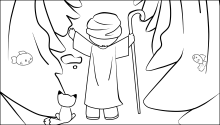 Crossing the Red Sea
Crossing the Red Sea Moses and the 10 Commandments
Moses and the 10 Commandments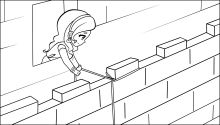 Rahab and the Two Spies
Rahab and the Two Spies Joshua at Jericho: The Walls Fall Down
Joshua at Jericho: The Walls Fall Down Gideon, Baal and the Curse of the Midianites, Part 1
Gideon, Baal and the Curse of the Midianites, Part 1 Gideon, Baal and the Curse of the Midianites, Part 2
Gideon, Baal and the Curse of the Midianites, Part 2 Samson and the Riddle
Samson and the Riddle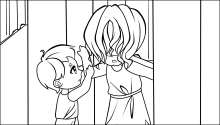 Samson, Delilah and the Secret
Samson, Delilah and the Secret Ruth, Naomi and Boaz Are Blessed
Ruth, Naomi and Boaz Are Blessed Hannah’s Gift—Samuel
Hannah’s Gift—Samuel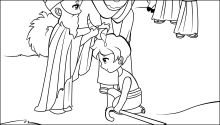 God Chooses David to Be King
God Chooses David to Be King David and Goliath
David and Goliath David and Bathsheba
David and Bathsheba Jehoshaphat and the Choir That Led an Army
Jehoshaphat and the Choir That Led an Army The Little Maid From Israel
The Little Maid From Israel King Ahaz Copies a Pagan Altar
King Ahaz Copies a Pagan Altar King Hezekiah and the Assyrian Bullies
King Hezekiah and the Assyrian Bullies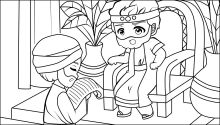 Josiah: The Boy Who Became King
Josiah: The Boy Who Became King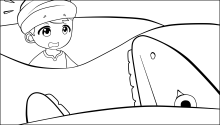 Jonah Disobeys God
Jonah Disobeys God Daniel and His Three Friends in Babylon
Daniel and His Three Friends in Babylon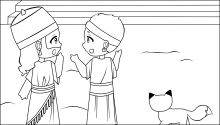 Shadrach, Meshach and Abed-Nego and the Fiery Furnace
Shadrach, Meshach and Abed-Nego and the Fiery Furnace Darius, Daniel and the Lions
Darius, Daniel and the Lions The Story of John the Baptist
The Story of John the Baptist The Birth and Baptism of Jesus Christ
The Birth and Baptism of Jesus Christ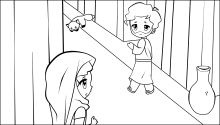 Jesus Grows Up
Jesus Grows Up Jesus Gives the Beatitudes
Jesus Gives the Beatitudes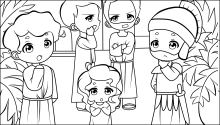 Jesus and the Feast of Tabernacles
Jesus and the Feast of Tabernacles Walking on Water
Walking on Water Jesus Blesses Little Children
Jesus Blesses Little Children Miracles Jesus Did
Miracles Jesus Did Jesus Enters Jerusalem and Cleans the Temple
Jesus Enters Jerusalem and Cleans the Temple Jesus and the New Testament Passover
Jesus and the New Testament Passover Paul and the Road to Damascus
Paul and the Road to Damascus
Learn More About Bible Study. From: https://lifehopeandtruth.com/bible/bible-study/bible-stories/
_______
The Actual Benefit of Diet vs. Drugs
Transcript of YouTube: https://youtu.be/P0y-lO2YpuQ
(To see any graphs, charts, graphics, images, and quotes to which Dr. Greger may be referring, watch the video below. This is just an approximation of the audio contributed by Katie Schloer.)
“The medical profession oversells the benefits of drugs for chronic disease since so few patients would apparently take them if doctors divulged the truth.
One of the reasons people may undervalue diet and lifestyle changes is an overconfidence in the ability of pills and procedures to prevent disease. For example, people tend to wildly overestimate the power of things, like mammograms and colonoscopies, to prevent deaths from breast and bowel cancer, or the power of drugs, like Fosamax, to prevent hip fractures, or the power of cholesterol-lowering drugs to prevent fatal heart attacks.
Patients believe statin drugs, like Lipitor, are about a hundred times more effective than they actually are in preventing heart attacks. Most people wouldn’t take multiple blood pressure medications if they knew the truth, which raises a dilemma for doctors. Most patients want to be told the truth. They want to be told what the chances are that the drugs will actually benefit them, but there is this tension between the patient’s right to know and the likely reduction in patients’ willingness to take the drug if they were so informed.
If taking a cholesterol-lowering drug would reduce your risk of getting a heart attack over the next five years by 100%, then, of course, everyone would take it. Even if there were a 50% chance of benefiting, most would still want to take the drugs. But if the chance of benefit is just a few percent, hardly anyone would be willing to take the drugs every day for the rest of their lives. And that’s the actual benefit.
For most people the chance of benefit is normally less than 5% over five years for cholesterol, blood pressure, and blood-thinning drugs. It’s no wonder that doctors seldom share these figures with patients. So, even high risk patients have less than a 5% chance of benefit; whereas, patients don’t want to take drugs unless they have at least a 1 in 5 chance—even those who just had a heart attack.
The study therefore suggests that informing patients of the percentage chance of benefit from preventive drug strategies will substantially reduce the uptake of such drugs. They recognize that for the individual, this is unlikely to be detrimental; after all there’s a 95% chance it won’t do anything for them, but for the population at large, it would make a difference; so, doctors and drug companies tend to oversell the benefits by conveniently not mentioning how tiny they actually are, knowing that most patients wouldn’t take them if doctors divulged the truth. To practice non-lifestyle medicine is to practice deceptive medicine.
The best cholesterol-lowering statin drugs can do here is an absolute risk reduction of 3.1% over six years. A whole foods plant-based diet has been shown to work twenty times better–an absolute risk reduction of 60% after less than four years. Overall, 99.4% of patients who stuck with the diet avoided major cardiac events, such as death from heart attack.
So, when we have to decide whether we want to go diet versus drugs, it’s not a choice between eating healthy to prevent a heart attack, or taking a pill to prevent a heart attack, because in 97% of cases the pills don’t do anything —we’re risking side effects for nothing, whereas if we treat the underlying root cause of the disease, by eating this healthy cholesterol-free diet, we may even reverse the progression of the disease.
Stop eating an artery-clogging diet and our bodies can start dissolving that plaque away, opening up arteries, in some cases, without drugs and without surgery. This wasn’t an Ornish study; so, no exercise requirement, no meditation, no stress management, no yoga; just a healthy whole food plant-based diet may work twenty times better than drugs to combat our #1 killer. Now, that’s something doctors may want to tell their patients.”
From: https://nutritionfacts.org/video/the-actual-benefit-of-diet-vs-drugs/
_______















No comments:
Post a Comment